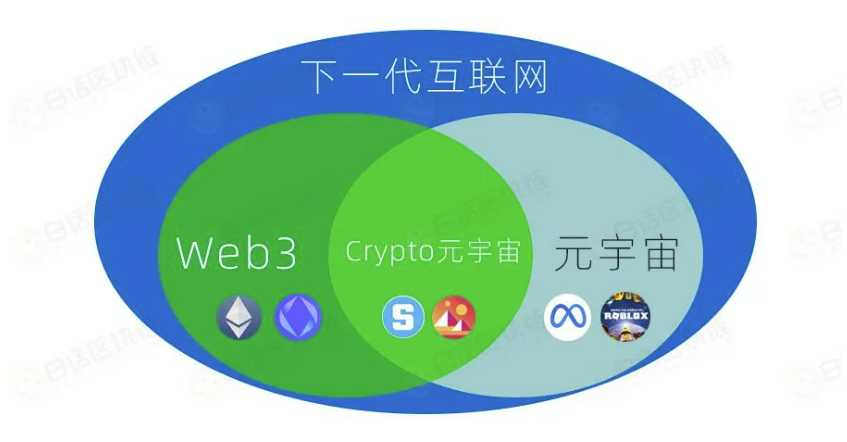Original link: https://www.hellobtc.com/kp/du/11/4025.html
Author: Mu Mu / Source: Vernacular Blockchain

Author | Mu Mu
Produced | Vernacular Blockchain (ID: helloBTC)
“Most of the project parties don’t know what Web3 is, so don’t embarrass each other.” Recently, a well-known crypto investor posted in a circle of friends to complain about Web3 project parties seeking investment.
Every wave of technological innovation can bring a lot of opportunities, and the “next-generation Internet” is no exception, but this time people seem to be in trouble in the process of waiting and digging for opportunities. The “Next Generation Internet” claimed in the current mainstream media, Kol, and even many books published is different, some say it is Web3, and some say it is the Metaverse, which makes people very “confused” . Not only ordinary people, we will find that many times even Web3 entrepreneurs can’t fully understand Web3 and the Metaverse. How can we truly grasp the new “wealth password”?
Perhaps all of this has to start with accurately defining Web3 and the Metaverse and clarifying the relationship between them…
01
Web3, the mainstream consensus on the definition of the metaverse
If you want to know if you understand it, then see if you can teach others. If someone asks you to explain what Web3 / Metaverse is, how would you explain it so that the other person can understand?
There are many definitions of Web3 and Metaverse, and there is definitely no standard answer, but in addition to relevant professionals, what should be paid attention to is its mainstream definition. New technologies usually follow the footsteps of mainstream consensus to develop. Therefore our definition of Web3 and the Metaverse should be as close to the mainstream consensus as possible:
a. Mainstream definition of Web3
First of all, there is no need to tangle between Web3 or Web3.0, it is just a name, whichever you like.
In recent years, the most thought about Web3 research and application is in the field of encryption, so we can refer to the definition of Web3 by the Ethereum Foundation.
-
The information at Web1.0 is for reading only;
-
Information at Web2.0 can be read and written;
-
Information at Web 3.0 can be read, written and owned. The point is to take back ownership of the data from the internet giants.
To use an example that everyone can understand as an analogy: A real estate developer built a lot of houses.
-
1.0, only for others to visit;
-
2.0, not only can visit but also let you live in, and live for free, but there are conditions in exchange : you must first register personal information, and you must authorize the camera in the house to record any moment in your life, including but not limited to bathing, sleep… and these information and pictures are to be stored by the developer, who can use and sell them for profit at any time for free;
-
3.0, everyone bought real estate to become owners, took back the ownership of the real estate from the developer, the right to profit from indoor and outdoor advertising, and established a community owners committee to jointly manage…
The Internet monopoly oligarchs born in the Web2.0 era, that is, the “developers”, why they are willing to provide free search engines, free emails, free Weibo, free chat and other services with excellent experience, in exchange for our privacy data For advertising analysis, selling for profit. In the future, we will spend a small amount of cost to ensure that private data and ownership are in our own hands, and at the same time, we will jointly manage the Internet platform through DAO to share benefits, just like the establishment of a community business committee to make property rights autonomous and autonomous. This is Web3. 0.
In short, under the background that users are eager to avoid the monopoly control of giants and regain ownership and governance rights , Web 3.0 is a natural evolution and a major upgrade of Internet information data ownership, so many people call it “the next”. Generation Internet”.
b. The mainstream definition of the metaverse
The metaverse is not a new term, but we define it with the latest mainstream consensus standing on the shoulders of our predecessors. The “meta” proposed by Facebook Zuckerberg, the “full Internet” proposed by Tencent Ma Huateng, and the first “Roblox” sandbox MMO game in the Metaverse From these three metaverse ideas, we can conclude:
Metaverse is a form of reconstructing the display and interaction of existing Internet information. People make the Internet “what you see is what you get” through AR\VR.
The metaverse example is much better. We can see from the changes in the Internet social applications that we are in daily contact with:
-
The earliest people communicated via the Internet using plain text (BBS, email, early versions of QQ)
-
Later, people’s online communication forms became more and more abundant, such as sending emoticons, voice chat, video making friends, social games (new versions of QQ, WeChat)
-
In the Metaverse, people can enter the online virtual world through VR devices to interact with others, games, conferences, and with the maturity of software and hardware and other infrastructure, the sense of immersion is continuously improved, and people feel more and more “immersive”
In short, under the guidance of users’ increasing demand for high-quality online application experience, the Metaverse has become an evolution and major upgrade of Internet application experience (visual, operation, etc.) Generation Internet”.
02
Next Generation Internet
Is it Web3 or the Metaverse?
Both Web3 and the Metaverse are said to be the next generation of the Internet, so Web3=Metaverse? Of course not. From the previous definition, we can easily find their differences and relationships. Web3 is the evolution and upgrade of data ownership, while the metaverse is the evolution and upgrade of user experience. The two belong to two perspectives. “Next Generation” . If there is an application that can satisfy the upgrade of data ownership and user experience at the same time, it is not impossible, then it is the combination of Web3 and Metaverse.
In addition, the Internet (Internet) is not equivalent to the Web. Whether the Web is 1.0, 2.0, or 3.0, it is just an application layer or a collection of information running on the Internet. The Internet includes the Web. In addition to the Web, it also includes Communication facilities, hardware and other infrastructure, we often say PC Internet, mobile Internet refers to the network mainly linked by PC and mobile devices (mobile phones, tablets, etc.) It can also be called the VR Internet. We connect to the virtual space through VR devices. This is the metaverse. So like Web3, the metaverse is also a subset of the Internet.

As shown in the schematic diagram, the next-generation Internet includes Web3 and the Metaverse, not only that, but also needs the support of infrastructure and terminals such as Vr and other visual and somatosensory devices, graphics rendering GPUs, AI and big data computing power equipment.
03
Who is Web3 or the Metaverse?
Blockchain/Crypto “True Love”
The mainstream definitions of Web3 and the metaverse and the relationship between them are basically clarified. Of course, the important link that cannot be ignored here is the blockchain or encryption.
Previously, many people have expanded the definition of the metaverse to the “next generation Internet”, which will make the metaverse an all-encompassing concept, even including Web3 and blockchain/encryption fields, the metaverse becomes omnipotent . In fact, the Metaverse does not necessarily need Web3 and blockchain. Facebook’s Meta and Tencent’s “full Internet”, and the first share of the Metaverse, Roblox, are almost irrelevant to Web3 and blockchain. Of course, in the field of encryption, the ideal metaverse must be a metaverse based on encryption. As for which is better, the encrypted metaverse or the centralized metaverse, it will take time to verify.
Web3 may not be the metaverse, but it may have to be supported by blockchain and encryption, and the infrastructure must be a public chain, not a consortium chain. Web3 users want to take back the ownership of data, let users carry out platform autonomy, and distribute income fairly. At first glance, it feels a bit “Shibian Nights”, which is why Web3 is also considered by some people to be an absolutely impossible “scam”. one of the reasons. However, in fact, as early as more than 10 years ago, a so-called “the first large-scale collaborative social experiment in human history” was born, which successfully proved that users can protect the sacrosanct of private assets without the leadership of an institution , autonomous and fair distribution of platform interests, that is Bitcoin.
Bitcoin fully conforms to the definition of Web3. Of course, its function is a single point-to-point payment system, and the governance rules are relatively simple, but it is precisely this simplicity that makes it particularly “anti-fragile” and stronger. Now, many decentralized projects such as public chains and DeFi are backed by a DAO as the sovereign organization of the project. Anyone who holds Tokens can participate in governance in various ways. Of course, DAO itself is also a “governance experiment”. In general, numerous cryptographic infrastructures and applications represent a good start for protecting personal data and for platforms to jointly and fairly govern the sharing economy.
On the other hand, some people have proposed a permissioned participation-based alliance chain that sacrifices certain things. It seems that it can only guarantee that the platform belongs to those few alliance chain nodes. The user does not have any power over the platform, and as long as the node is willing, the user will lose control of the data at any time. ownership. Some domestic digital Tibetan platforms that are frequently shut down are typical examples, which should not need too much explanation.
To sum up, we can easily conclude that Web3 is currently only supported by blockchain encryption, and the metaverse does not necessarily need the support of blockchain and encryption, but if the dual benefits of encryption and metaverse can be combined , is indeed a future form worth pursuing.
04
summary
It can be said that the next-generation Internet is both Web3 and the metaverse. At the same time, the relationship between Web3 and the metaverse gradually emerges with the definition of mainstream consensus . They belong to the most important “right-hand man” of the next-generation Internet. They can be combined or can be combined. independent. Blockchain and encryption support is the only option for Web3, optional for the Metaverse. The next generation of the Internet is just around the corner, but it should still be a long way off.
This article is reproduced from: https://www.hellobtc.com/kp/du/11/4025.html
This site is for inclusion only, and the copyright belongs to the original author.